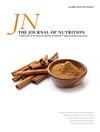饮用人工甜味饮料的血清代谢组学标记。
IF 3.7
3区 医学
Q2 NUTRITION & DIETETICS
引用次数: 0
摘要
背景:人工甜味饮料的消费量呈上升趋势。使用人工甜味剂与不良健康后果有关。有必要确定人工甜饮料的新型客观生物标志物,以改进膳食评估并深入了解其对代谢的影响:我们旨在确定与饮用人工甜味饮料有关的血清代谢物:在 "社区动脉粥样硬化风险"(ARIC)研究中,使用食物频率问卷对人工甜味饮料的消费情况进行了评估,并在第一次研究访问(1987-1989 年)期间采集了空腹血清样本。如果参与者表示几乎从未饮用过人工甜味饮料,则被归类为 "不饮用者";如果每月饮用 1 杯至每周饮用 6 杯,则被归类为 "中度饮用者";如果每天饮用≥1 杯,则被归类为 "大量饮用者"。在两个分组中进行了非目标代谢组学分析(分组1:n=1,866,2010年分析;分组2:n=2,072,2014年分析),分析了360种代谢物。在这项二次数据分析中,使用了多变量线性回归模型,并对人口统计学、健康行为、健康状况和饮食因素进行了调整。对每个分组进行了分析,并对结果进行了荟萃分析:在对 ARIC 研究访问 1 的 3938 名一般健康的参与者(平均年龄 54 岁,60% 为女性,62% 为黑人)进行的荟萃分析中,有 11 种血清代谢物与人工甜味饮料的摄入量显著相关。人工甜味饮料摄入量越高,10 种代谢物(糖精、苏氨酸、赤藓糖醇、甘油酸、葡萄糖酸、甘露醇、葡萄糖、色氨酸甜菜碱、曲哈糖和 N6-乙酰甘氨酸)的含量就越高,而硫酸甘胆烯酸酯的含量就越低:我们发现 11 种血清代谢物与人工甜味饮料的摄入有关,其中包括已知的糖替代品、加工食品添加剂、葡萄糖相关化合物和肠道微生物相关代谢物。这些发现增进了我们对人工甜味剂代谢活动的了解,并为监测摄入量提供了新的生物标志物。本文章由计算机程序翻译,如有差异,请以英文原文为准。
Serum Metabolomic Markers of Artificially Sweetened Beverage Consumption
Background
The consumption of artificially sweetened beverages is on the rise. Use of artificial sweeteners has been associated with adverse health outcomes. There is a need to identify novel objective biomarkers of artificially sweetened beverages in order to improve dietary assessment and to provide insight into their metabolic impact.
Objectives
We aimed to identify serum metabolites that are associated with artificially sweetened beverage consumption.
Methods
In the Atherosclerosis Risk in Communities (ARIC) study, consumption of artificially sweetened beverages was assessed using a food frequency questionnaire and fasting serum samples were collected during the first study visit (1987–1989). Participants were categorized as nonusers if they reported almost never consumption of artificially sweetened beverages, moderate users for 1 glass/mo to 6 glasses/wk, and heavy users for ≥1 glasses/d. Untargeted metabolomic profiling was conducted in 2 subgroups (subgroup 1: n = 1866, profiled in 2010; subgroup 2 profiled in 2014: n = 2072), and 360 metabolites were analyzed. In this secondary data analysis, multivariable linear regression models were used, adjusting for demographics, health behaviors, health status, and dietary factors. Analyses were conducted in each subgroup and results meta-analyzed.
Results
In a meta-analysis of 3938 generally healthy participants (mean age, 54 y; 60% women; 62% Black participants) from ARIC study visit 1, 11 serum metabolites were significantly associated with artificially sweetened beverage consumption. Heavier consumption of artificially sweetened beverages was associated with higher concentrations of 10 metabolites (saccharin, threonate, erythronate, glycerate, gluconate, mannitol, glucose, tryptophan betaine, trehalose, and N6-acetyllysine) and lower concentrations of glycocholenate sulfate.
Conclusions
Eleven serum metabolites are related to artificially sweetened beverage intake, which consist of known sugar substitutes, processed food additives, glucose-related compounds, and gut microbiome–related metabolites. These findings enhance our knowledge of the metabolic activity of artificial sweeteners and suggests new biomarkers for monitoring intake.
求助全文
通过发布文献求助,成功后即可免费获取论文全文。
去求助
来源期刊

Journal of Nutrition
医学-营养学
CiteScore
7.60
自引率
4.80%
发文量
260
审稿时长
39 days
期刊介绍:
The Journal of Nutrition (JN/J Nutr) publishes peer-reviewed original research papers covering all aspects of experimental nutrition in humans and other animal species; special articles such as reviews and biographies of prominent nutrition scientists; and issues, opinions, and commentaries on controversial issues in nutrition. Supplements are frequently published to provide extended discussion of topics of special interest.
 求助内容:
求助内容: 应助结果提醒方式:
应助结果提醒方式:


